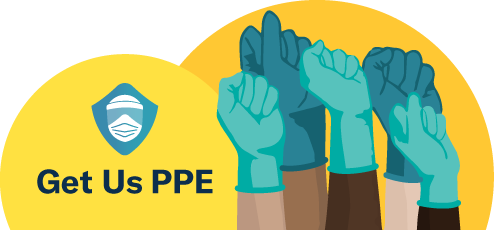Interviewed and edited by Erika Lynn-Green and Daniel Packard
This interview has been condensed and edited for clarity
On the origins of Protect Native Elders
My name is Jo Overton. I am an enrolled tribal member of, what the federal government calls, the Rosebud Sioux. However, we call ourselves the Sicangu Lakota. My family continues to live on the reservation. I live in Utah. [Protect Native Elders] all started with a conversation that I had with a friend, Andi. I’m pretty sure she’s the one who introduced me to Tyrone Whitehorse. Tyrone and I were talking about doing masks. He had a GoFundMe and he was delivering masks to the reservation for the elders. I think ultimately he gave away three thousand face-masks. Along with giving them [the people of the reservation] masks, he was also giving them boxes of food for the elders. And so Tyrone and I got talking, and I said, “What can we do together? I cannot stand here and do nothing while people die.” It was a matter of, maybe a week, before we connected with Dimitri, and GetUsPPE, and then things just started to widen out in terms of our vision and mission. I told my husband, it’s like building a boat while you’re on the ocean in a storm. I have a degree in social work with an emphasis in medical social work, so I have the skill set that fits really well into what I’m doing.
On the mission of Protect Native Elders
I feel my ancestors with me every day, guiding me, and bringing things into my life and into this organization in such a wonderful way. I say, “We cannot lose our elders,” because we lose who we are when we do that, and I believe with all my heart that our elders are our future because they are the keepers of all the wisdom and all the knowledge. And if we lose them, we lose the knowledge of which way we need to go. And we lose part of who we are. We must do everything to preserve them, and in preserving them, we preserve ourselves. If we are to keep their health, we need to be healthy. We need to have good health practices. We need to get medical care.
 The arrow is our logo, and an arrow must be pointed, and an arrow must have force behind it, and we are all of those things. And so, we go, we look, we say, “That place is in trouble.” We call them, we say, “What do you need?” And then we do our absolute best to make sure that they get what they need. These people continue to risk their lives every day, and I’m not okay with this! All of us are not okay with this – we’re going to do something! And so it’s brought together this amazing conglomeration of partnerships and collaborations with different organizations. [When] Tyrone says, “Kayenta Clinic called; they’re in trouble. Can you help them?” I call Kayenta, and they are the epicenter and continue to have the place with the most COVID patients, and they said we were the first people to contact them. And they said, “We thought no one cared.” No, people do care. And you are not standing alone in this.
The arrow is our logo, and an arrow must be pointed, and an arrow must have force behind it, and we are all of those things. And so, we go, we look, we say, “That place is in trouble.” We call them, we say, “What do you need?” And then we do our absolute best to make sure that they get what they need. These people continue to risk their lives every day, and I’m not okay with this! All of us are not okay with this – we’re going to do something! And so it’s brought together this amazing conglomeration of partnerships and collaborations with different organizations. [When] Tyrone says, “Kayenta Clinic called; they’re in trouble. Can you help them?” I call Kayenta, and they are the epicenter and continue to have the place with the most COVID patients, and they said we were the first people to contact them. And they said, “We thought no one cared.” No, people do care. And you are not standing alone in this.
On the day-to-day operations
Because we’re not obligated in any way to anybody about it, if [towns like] Page or Gallup or Farmington says, “We need five hundred face shields now,” we can get them to them in a week. If they say, “We need cloth masks,” I have five hundred cloth masks sitting in my living room right now that I can mail out, as quick as that. And so we have different things on the ground, and we have supplies on the ground in California, we have supplies on the ground here in Utah. We have the ability to get it delivered to the reservation through the footwork and different people that are a part of our team. I wish we had more money, so that we could really answer all of it [the need] right now, right here. They say, “We need a thousand gowns today,” and I wish with all my heart that we had the money to just buy all that and get it there. We can get rid of $25,000 worth of PPE in a blink. I’ve got a list much longer than that.
On the intertwining challenges
I think people might not completely understand how important it [PPE] is, understanding that many of the elders in the Navajo nation don’t read English or Navajo. We are printing picture cards for them, to help them. They live in multi-generational homes, so it means that isolating one person is not possible. We have to keep the other people around them healthy also, while the COVID person is recovering, and keep it not from going across the family. And so all those things that go into that, that they need gloves, they need masks, they need hand sanitizer, and they need information. Right now, we’re really focused on the Navajo reservation, but we’re also working with the Apache nation [and the] Tohono O’Odham, working with their first responders, working with their medical PPE needs, and [other] things that their people need.
If you don’t want more COVID in the community, that means the people who have COVID in their home need to be able to stay home. When you’re in a really remote area, and you have no running water, no electricity, and no internet, there are needs that need to be met. It isn’t one thing. If you’re in America, if you’re on a reservation, you are ten times more likely to get it, and four times more likely to die from [COVID]. We’re talking a hundred and fifty years of all of this, building up to people actually paying attention, because COVID is killing us in such great numbers. And, truly, from [then] to where we are now, it is institutionalized genocide.




